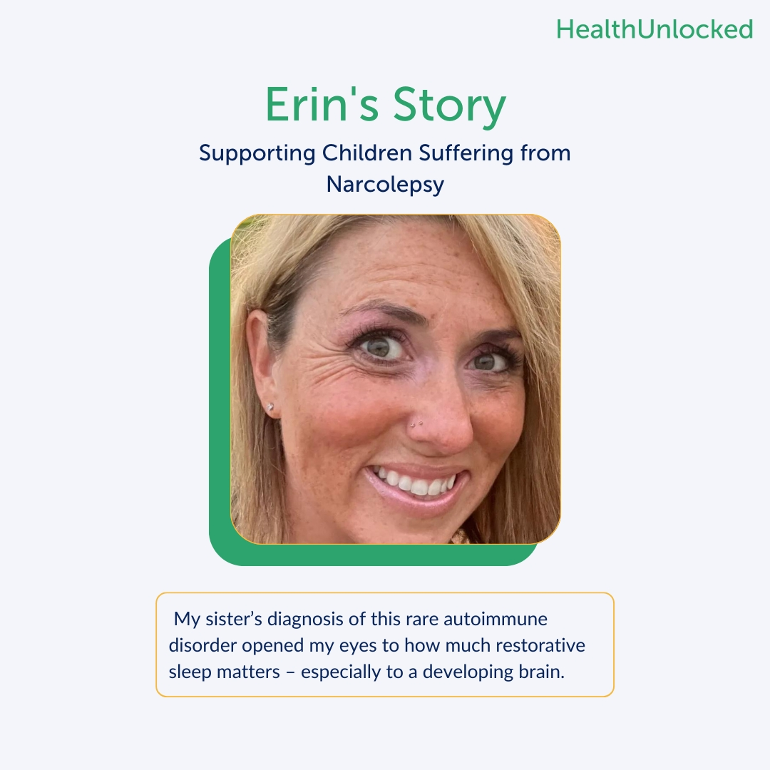This week, we hear from FACES of Narcolepsy founder Erin Carey's - this is a truly inspiring story of love, support and fearless devotion.
--------
I created FACES of Narcolepsy in 2017 when I joined forces with four other moms from across the U.S. to fill a need in the pediatric narcolepsy community, but FACES of Narcolepsy truly began when my sister was diagnosed with narcolepsy with cataplexy 10 years earlier. My sister’s diagnosis of this rare autoimmune disorder opened my eyes to how much restorative sleep matters – especially to a developing brain.
When my daughter told me that she was sleeping through class in fifth grade, I began to get suspicious and quickly sent an email to her teacher. The teacher told me she didn’t notice her sleeping (narcoleptics often sleep with their eyes open) and that her performance hadn’t slipped. She was taking naps every day after school, but I figured she was going through a growth spurt. When her naps took over her evenings, preventing her from doing homework or playing sports, and we began to see small signs of cataplexy, I knew what we were looking at. She was diagnosed in sixth grade, and 18 months after her diagnosis another one of our daughters was diagnosed at age nine.
Narcolepsy is a chronic neurological disorder that affects the brain’s ability to control sleep-wake cycles and has five main symptoms: excessive daytime sleepiness, sleep hallucinations, sleep paralysis, sleep disruption, and cataplexy. Cataplexy is the involuntary loss of muscle control that can result in small muscle drop – like a tongue hanging out all the way up to a full body drop. Narcolepsy affects one in 100,000 children.
Each person diagnosed with narcolepsy experiences varying degrees of these symptoms and some symptoms can develop further over time. One of my daughters has horrific sleep hallucinations of being murdered that feel so real they leave her with lasting feelings of depression. Not being able to rescue my girls from sleep attacks or hallucinations is the most debilitating part for me as their mother.
Unfortunately, sleep doctors all too often only prescribe stimulants to treat their patients. This regimen was a nightmare for our daughters. Taking an exhausted child and giving her stimulants is like taking an exhausted hamster and tethering it to a hamster wheel all day. Finally, after my daughters were treated with restorative sleep medication in combination with stimulants, we saw huge improvements in their quality of life.
In 2017, myself and four other mothers of narcoleptic children began a journey to ensure families whose children were diagnosed had a group to turn to for connection, guidance, education, and support. We decided that not only did we need a support group online (facesofnarcolepsy.org), but we also needed a physical event where families could connect. We created “Campference,” an annual event that families attend together. The parents have a conference style experience and the children with narcolepsy and their siblings have a camp style experience. We provide support from many angles – from bringing in leading doctors, nutritionists, psychologists, and school planning experts, while also focusing on team building and FUN for our kids who attend.
I will never forget the first evening of our first Campference in Texas. We held a smores night for the families to get to know each other. The children were playing under the trees, laughing and experiencing cataplexy freely in front of each other. At home these children typically guard against having cataplexy in front of other children as they find it embarrassing. They realize they look different, so they guard their bodies against their triggers, which are typically emotions. It was that moment when I knew we had created something magical – a place where families could exhale, cry, embrace, and grow.
While narcolepsy will always be a part of our children’s lives, they will forever know that they are not alone. They are creating a community beyond our group as they grow and mature. Many of our families return to Campference each year. The bonds, text chains, and friendships have grown, and we are excited to see what our kids do with their bright futures!
-------
Erin Carey is an entrepreneur living in northern Illinois with her husband and five daughters. She enjoys making things with her hands and spending time with their French bulldogs. For more information about the non-profit organization FACES of Narcolepsy, visit facesofnarcolepsy.org.
-------
Thank you, Erin, for sharing your story with our readers.
-------
If you have a story to share with our readers about participating in a clinical trial, overcoming adversity, or living with a chronic condition, please let us know. We’d love to have you guest blog for us. Guest blogging helps others learn about your struggles and increases awareness and understanding. Contact us at support@healthunlocked.com to get started sharing your story now!
